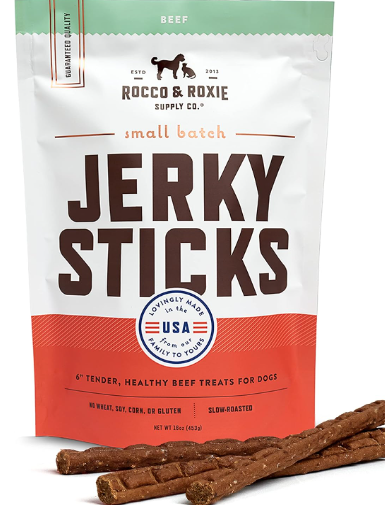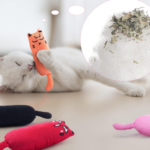Cats, being obligate carnivores, have a diet that must consist primarily of meat-based proteins to maintain their health and well-being. Unlike omnivores, which can derive nutrition from a variety of sources, cats require a meat-heavy diet to get the essential nutrients necessary for their survival.
Table of Contents
Feeding them human food can often be risky, especially when considering heavily processed foods like beef jerky. Understanding what foods are appropriate for cats is key to ensuring that they stay healthy and avoid potential health risks.
As pet owners, it’s natural to want to share our snacks with our feline companions. However, their unique dietary needs mean that many foods we enjoy are not suitable for them. This is particularly true for processed snacks, which may contain ingredients that are harmful or even toxic to cats. Before giving your cat any human food, it’s essential to know what their bodies require and what could harm them.
What Should a Cat’s Diet Consist Of?
A proper feline diet primarily consists of high-quality animal proteins. These can come from sources like chicken, beef, turkey, and fish. Cats also need specific nutrients, such as taurine, which is an amino acid found only in animal tissues. Taurine is essential for their vision, heart function, and overall health. A diet lacking in taurine can lead to severe health issues, including blindness and heart disease.

In addition to protein, cats need fats to provide them with energy. While they can digest fats effectively, they cannot efficiently process carbohydrates, which should make up only a small portion of their diet. Commercial cat food is typically balanced to provide the right amounts of protein, fat, and other essential nutrients, but it’s important to avoid overloading your cat with carbohydrates and sugars that they cannot process properly.
Why Protein is Important for Cats
Protein is vital for cats because it supplies the essential amino acids their bodies cannot produce on their own. Unlike other animals, cats break down protein rapidly, so they need a diet high in it to maintain muscle mass, promote a healthy immune system, and support vital bodily functions like enzyme production. Without enough protein, cats can suffer from muscle wastage, weakened immune responses, and energy deficits.
Another important nutrient cats require is taurine, which is found in animal protein. A lack of taurine can lead to irreversible damage to a cat’s heart and eyes. Protein is also necessary for keeping their coat and skin healthy, and because they rely so heavily on animal-based proteins, their diet must be rich in these nutrients.

What is Beef Jerky?
Beef jerky is a snack made from dried, cured meat, often seasoned with salt, spices, and preservatives to prolong its shelf life and enhance flavor. The drying process removes the moisture from the beef, concentrating the flavors and increasing the shelf stability. While beef jerky is considered a convenient, high-protein snack for humans, its ingredients and processing methods are far from suitable for animals, especially cats.
The beef used in jerky is often treated with a variety of ingredients that can be harmful to pets. It’s not just the meat itself but also the additives that make beef jerky a problematic treat for felines. The high levels of salt, sugar, and spices that give beef jerky its distinctive taste are all ingredients that can cause harm to your cat’s digestive system and overall health.
Ingredients Typically Found in Beef Jerky
Most beef jerky recipes include more than just meat. Common ingredients found in commercial jerky include salt, sugar, soy sauce, garlic powder, onion powder, and various preservatives like nitrates and nitrites. These additives make the jerky tastier and last longer, but they also make it unsuitable for cats.
For instance, the high sodium content in beef jerky can lead to sodium poisoning in cats. Sodium poisoning causes symptoms like vomiting, diarrhea, lethargy, and even seizures in extreme cases. Additionally, garlic and onion powders, which are common flavorings in jerky, are toxic to cats and can damage their red blood cells, leading to anemia. Sugar is another ingredient that should be avoided, as cats have no nutritional requirement for sugar, and consuming it can contribute to obesity and diabetes.
How is Beef Jerky Made?
The process of making beef jerky starts with slicing the beef into thin strips, which are then marinated in a combination of salt, spices, and sometimes sugar. These strips are then dried over several hours, either in a dehydrator or in an oven at a low temperature, until all the moisture is removed. This process makes the meat shelf-stable, meaning it can last for a long time without refrigeration.
While this method of preservation makes beef jerky convenient and long-lasting, it also makes it highly concentrated in salt and spices. These concentrated ingredients can pose serious health risks to cats. Even homemade beef jerky, if seasoned or cured improperly, can be dangerous for your pet, as their bodies are not equipped to handle the added ingredients commonly used in jerky.
Can Cats Eat Beef Jerky?
The short answer is no—cats should not eat beef jerky. While the primary ingredient, beef, is a good source of protein, the way jerky is processed makes it unsafe for feline consumption. The high salt content, along with spices and preservatives, can be harmful to cats, even in small amounts. Beef jerky is not formulated with the specific needs of cats in mind, and it can lead to digestive issues, sodium poisoning, and other health complications.
Some pet owners may wonder whether giving their cat an unseasoned, homemade version of beef jerky is a safer alternative. While plain, dried beef might seem harmless, it still lacks the essential nutrients that a balanced cat treat or meal should provide. It’s always better to stick to snacks designed specifically for cats.
Is Beef Jerky Safe for Cats?
Beef jerky, especially the commercial variety, is not safe for cats due to its high sodium levels and the presence of potentially toxic ingredients like garlic and onion powder. Cats are highly sensitive to these seasonings, which can cause damage to their red blood cells, leading to anemia. Even a small amount of these ingredients can be harmful.

In addition, the preservatives used in jerky, such as nitrates and nitrites, are not suitable for a cat’s delicate digestive system. These preservatives can cause gastrointestinal upset, and over time, their accumulation in the body could lead to more severe health problems.
The Dangers of Spices and Preservatives for Cats
Many spices used in beef jerky, such as garlic, onion, and pepper, are toxic to cats. Garlic and onion, in particular, can cause hemolytic anemia, a condition in which a cat’s red blood cells are destroyed, leading to a shortage of oxygen being delivered to their organs. Even small amounts of garlic or onion powder can cause this condition, making jerky a dangerous treat for felines.
Preservatives like nitrates and nitrites, which are often added to jerky to extend its shelf life, can also pose health risks. These chemicals have been linked to digestive issues and can contribute to the development of certain cancers when consumed in large amounts over time. Cats are especially vulnerable to the harmful effects of these preservatives, as their smaller bodies and sensitive digestive systems are less capable of processing such chemicals safely.
What to Do If Your Cat Eats Beef Jerky?
If your cat happens to eat beef jerky, it’s important to act quickly and monitor their behavior. Depending on how much they’ve eaten and the ingredients involved, your cat may experience anything from mild digestive upset to more serious symptoms. In cases where toxic ingredients like garlic or onion are involved, immediate action is necessary, as these can cause significant harm to your cat’s health.
Signs of Digestive Distress in Cats
If your cat has eaten beef jerky, keep an eye out for signs of digestive distress. Common symptoms include vomiting, diarrhea, excessive thirst, and lethargy. Cats may also display signs of abdominal discomfort, such as pawing at their stomach or curling up in a tight ball. If these symptoms persist or worsen, it could indicate that your cat is suffering from sodium poisoning or reacting to the toxic ingredients in the jerky.
Severe symptoms, such as difficulty breathing, tremors, or seizures, are more concerning and require immediate veterinary attention. These symptoms could indicate a more serious reaction, such as an electrolyte imbalance or a response to toxins in the jerky, and prompt treatment is crucial to prevent long-term damage.
How to Respond to Beef Jerky Consumption
If your cat has consumed beef jerky, the first step is to remove the jerky and prevent them from eating any more. Next, check the ingredient list to determine if the jerky contains toxic ingredients like garlic, onion, or high levels of salt. If these ingredients are present, contact your veterinarian immediately for advice on how to proceed.
Your vet may recommend monitoring your cat for any signs of distress or bringing them in for an examination. In cases where your cat has consumed a significant amount of jerky or is displaying severe symptoms, emergency treatment may be required. Be prepared to provide your vet with information about the jerky’s ingredients and how much your cat consumed.
Alternatives to Beef Jerky for Cats
If you’re looking for a high-protein treat for your cat, there are plenty of safe alternatives to beef jerky. Many pet stores offer protein-rich cat treats that are specially formulated to meet your cat’s dietary needs. These treats are made from quality ingredients, free from harmful preservatives, and designed to be both tasty and nutritious.

Cat-Friendly Protein Snacks
One of the best alternatives to beef jerky is freeze-dried meat treats, which are made from single-ingredient proteins like chicken, beef,
Cat-Friendly Protein Snacks
One of the best alternatives to beef jerky is freeze-dried meat treats, which are made from single-ingredient proteins like chicken, beef, turkey, or fish. These treats are high in protein, low in carbohydrates, and free from harmful additives, making them a healthy and safe option for cats. Unlike beef jerky, freeze-dried treats don’t contain salt, spices, or preservatives that could upset your cat’s digestive system or cause health issues.
Freeze-dried treats retain the natural flavor of the meat, which makes them appealing to cats, while still being easy to store and feed. Additionally, they offer a crunchy texture similar to jerky, satisfying your cat’s desire for a chewy snack without the risks associated with human-grade jerky. These treats are widely available at pet stores and online, with a variety of flavors to choose from, ensuring that even picky eaters can find something they enjoy.
Homemade Treat Ideas
If you prefer to make your own cat treats at home, there are simple recipes you can follow that provide safe, nutritious, and tasty options for your feline friend. One popular idea is to prepare homemade, unseasoned, boiled or baked chicken strips. Simply cook the chicken thoroughly, allow it to cool, and cut it into small, cat-sized pieces. This ensures your cat gets a healthy, high-protein snack without any harmful additives.
Another idea is to prepare cat-friendly tuna or salmon bites. You can use canned tuna or salmon (packed in water, not oil or brine) and mix it with a small amount of oat flour to create bite-sized treats. Bake the mixture at a low temperature to remove moisture, leaving you with a crunchy, cat-friendly snack. Homemade treats give you control over the ingredients, allowing you to cater to your cat’s specific dietary needs and preferences.
Q&A Section
Q: Can beef jerky be part of a cat’s regular diet?
A: No, beef jerky should not be part of a cat’s regular diet. While beef itself is a good source of protein, the way jerky is processed makes it dangerous for cats. The high levels of salt, sugar, and preservatives can cause severe health issues, including sodium poisoning and digestive problems. Additionally, spices like garlic and onion, commonly found in jerky, are toxic to cats and can lead to serious medical conditions such as anemia. It’s better to stick to cat-specific treats that are formulated to meet their nutritional needs.
Q: What are some safe snack options for cats?
A: Safe snack options for cats include freeze-dried meats, which provide the same high-protein benefits without harmful additives. You can also offer small amounts of plain, cooked meats such as chicken, turkey, or fish, ensuring they are free from salt, seasonings, and oils. Commercially available cat treats made from high-quality ingredients are another excellent choice, as they are designed to be both healthy and appealing to cats. Avoid feeding your cat processed human foods or anything containing harmful ingredients like onions, garlic, or excessive salt.
Conclusion
While beef jerky may seem like a protein-packed snack that could appeal to your cat, it’s not a safe option for feline consumption. The spices, preservatives, and high levels of sodium used in the preparation of jerky make it unsuitable for cats, potentially leading to digestive distress, sodium poisoning, and exposure to toxic ingredients. Instead, opt for cat-friendly alternatives like freeze-dried treats, plain boiled meats, or homemade treats designed specifically for feline nutrition.
By understanding your cat’s dietary needs and being cautious about what you offer them, you can ensure they stay healthy, happy, and free from the risks associated with inappropriate foods. When in doubt, always consult your veterinarian before introducing new foods into your cat’s diet.



